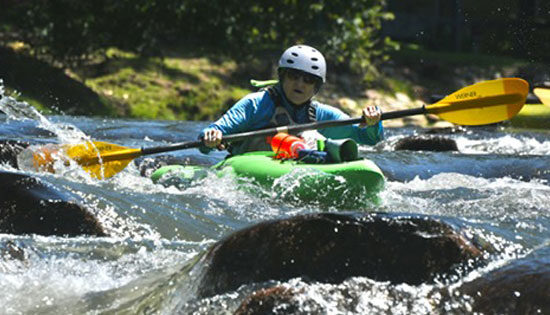Photo: Ebenezer Creek with its massive cypress trees is a tourism destination in Effingham County that supports multiple canoe/kayak outfitters. It is one of many streams that could be closed to the public if the Georgia legislature takes a narrow view of where the public has a right to boat.
ATHENS – The Freedom to Float Coalition announces a new map tool to help in the debate over public access to Georgia’s rivers and streams.
Release:
The Freedom to Float Coalition (FTFC) announced the availability of an online survey and map tool that allows river users to document the locations where they have boated. The purpose of the tool is to catalog those stream reaches that the public is currently using and identify the upper limits of river usage on Georgia streams. The survey can be accessed here: https://arcg.is/1Dr95C1
The FTFC, made up of American Whitewater, American Canoe Association, Georgia Canoeing Association, Tennessee Valley Canoe Club and Georgia River Network, is providing the mapping tool to inform a special House Study Committee on Navigable Streams that has been tasked with making recommendations to the full General Assembly about where the public should have the right to boat. That committee is expected to hold meetings later this year.

This ongoing debate pits landowners against river users and small businesses that depend on public access to the state’s rivers and streams. Legislation that was introduced, but not adopted, during the 2024 legislative session would have put multiple small businesses at risk of being shut down by property owners seeking to exclude the public from floating down popular boating destinations across the state.
Georgia legislators meeting later this year to solve the prickly issue of which streams in the state should be open to the public for recreation will have another tool to inform the debate thanks to a coalition of outdoor recreation organizations.
The tool is an online map that allows river users to document which sections of rivers and streams they have boated upon in the past. Interested boaters can input their trips at: https://arcg.is/1Dr95C1

“The goal of the map is to give paddlers a way to contribute information about some of the streams and rivers that they are using,” said Kevin Colburn, national stewardship director with American Whitewater which created the online tool, “Georgia leaders need to know the extent to which even small streams support the state’s robust outdoor recreation and tourism economy.”
In 2022, boating and fishing were responsible for more than $1 billion in economic activity in Georgia. The state’s rivers and streams support some 70 canoe/kayak/tube outfitter businesses and countless fishing guides along with businesses ranging from outdoor retailers and manufacturers to convenience stores and hotels.
The Freedom to Float Coalition (FTFC), which includes American Whitewater, Georgia Canoeing Association, American Canoe Association, Tennessee Valley Canoe Club and Georgia River Network is urging lawmakers to preserve existing river uses and protect the public’s ability to float down these streams.
Top outdoor recreation business leaders have signed on to this initiative in a letter to legislators asking them to defend the right to boat Georgia’s rivers and streams. Some of these leaders include High Country Outfitters, Nantahala Outdoor Center, Southeast Adventure Outfitters, Outdoor Foundation, Trust for Public Land as well as Georgia-based manufacturers like Dreamboats Kayaks and Suspenz Kayak Carts & Storage.
The House Study Committee on Navigable Streams, set to meet in the coming months, grew out of controversy surrounding where Georgians have the right to boat, fish and hunt on the state’s waterways. Current state law guarantees the public’s right to access all of the state’s navigable streams, but the state’s definition of “navigable” dates back to 1863 when steamboats and cotton barges were the most
common vessels seen on the state’s rivers.
That 1863 definition asserts that for a stream to be navigable it must be capable of floating a boat loaded with freight.
“Aside from being vague—what qualifies as freight?–that definition no longer reflects how we use our rivers today,” said Andrea White, community program coordinator with Georgia River Network and a member of the American Canoe Association board of directors, “None of Georgia’s inland rivers currently support boats loaded with commercial freight, but they do support hundreds of businesses
that serve a robust river recreation economy.”
Whether a stream is deemed “navigable” has far-reaching implications because of the state’s property laws. Along navigable streams, property lines end at the low water mark along the bank, but state law provides that landowners along non-navigable streams own the streambed to the center line. In the 1990s, the Georgia Supreme Court ruled in two separate cases that a landowner possessing both sides of a stream can restrict the public from passing down that stream.
To date, those decisions on Ichawaynochaway Creek in Southwest Georgia and Armuchee Creek in Northwest Georgia represent the only two instances where the courts or the state legislature has deemed a stream “non-navigable” in the modern era, according to the FTFC.
Earlier this year, in an effort to clarify where the public can boat, fish and hunt, lawmakers introduced legislation that named sections of 64 streams and rivers as “presumed navigable.” It was met with opposition from both landowners and outdoor recreation advocates and led to the creation of the study committee on navigable streams.
Left off that “navigable” list were dozens of popular tourism destinations, including streams like Ebenezer Creek, South Chickamauga Creek and Big Cedar Creek and the Cartecay River and Upper Chattahoochee River where outfitters provide canoe, kayak and tube rentals.
“In these locations if the stream is presumed “non-navigable” a single property owner could shut down businesses that have operated for decades,” said Dan MacIntyre, river access chairman with Georgia Canoeing Association. “The legislature needs to preserve these existing uses and protect the right to float or pass down these streams regardless of whether they meet the state’s outdated
definition of navigability.”
The FTFC is urging citizens to contact their legislators about this issue. Additional information and links to action alerts can be found at: https://garivers.org/protect-our-freedom-to-float-georgia-rivers/
Georgia River Network is a statewide non-profit river advocacy group with the mission to connect people with and protect Georgia’s rivers. GRN is GA DNR’s non-profit river recreation partner coordinating the statewide water trails program and created the Georgia River Guide free mobile app.
American Whitewater is a national non-profit river conservation organization with the mission to protect and restore America’s whitewater rivers and to enhance opportunities to enjoy them safely.
American Canoe Association is a national non-profit organization that serves the broader paddling public by providing educational programs, supporting stewardship initiatives that affect paddlers and offering competition opportunities for athletes of all abilities.
Georgia Canoeing Association is a non-profit organization that promotes public river access, boating safety and canoeing and kayaking opportunities across the state.
Tennessee Valley Canoe Club is a 501(c)(7) organization based in Chattanooga/North Georgia that brings together a diverse population of people who are interested in canoeing, kayaking, and related activities; to increase the knowledge, safety, and appreciation of paddle sports; and to support conservation
and preservation of recreational waterways.
FOR MORE INFORMATION CONTACT:
Kevin Colburn, American Whitewater, 828-712-4825, kevin@americanwhitewater.org
Andrea White, Georgia River Network/ACA Southeast, 615-482-5570, andrea@garivers.org
Dan MacIntyre, Georgia Canoeing Association, 770-551-2747, dmacintyre4@gmail.com
Joe Cook, Georgia River Network, 706-409-0128, joe@garivers.org











